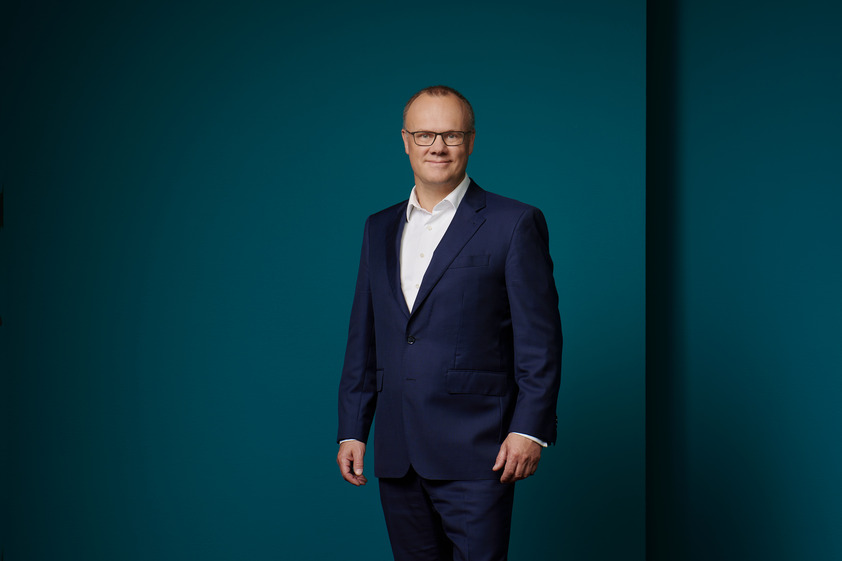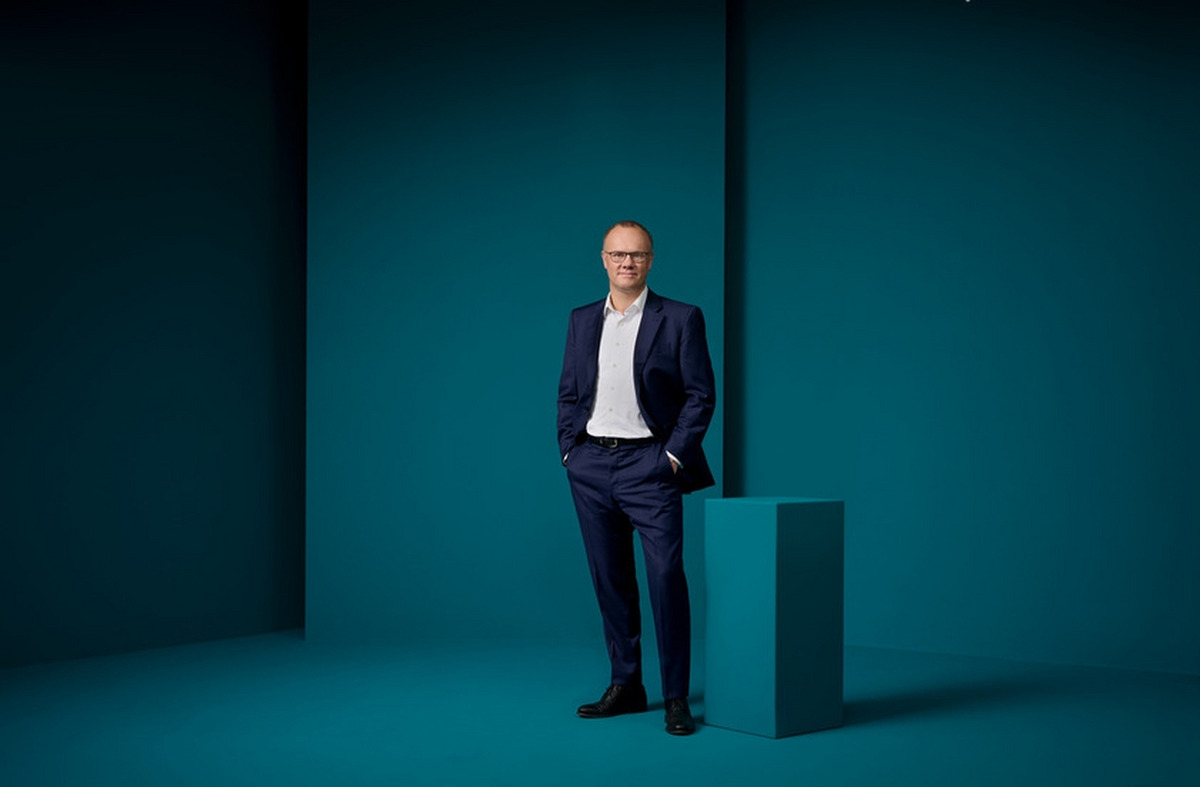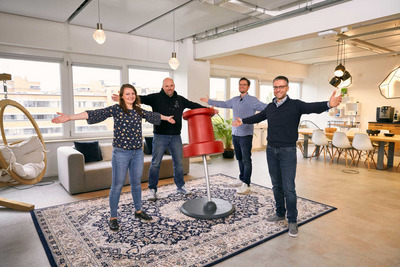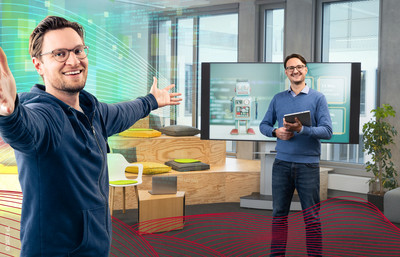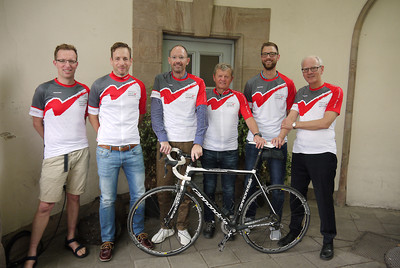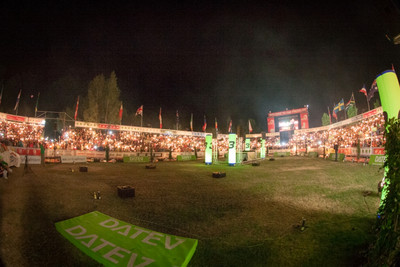#Ecosystem Innovation: DATEV CEO Dr Mayr in conversation
At the end of the #Ecosystem Innovation special, we take a look at corporate culture, experimentation and free thinking with DATEV CEO Dr Mayr.
Dr Mayr, have you been innovative yet today?
Personally, I see everything that I don't do in a standardised way as an innovative action. My job means that I constantly have to think my way into new topics and make decisions, so it goes without saying that I look at each issue from different angles. In this respect, I would say that yes, I have been innovative a few times today - like every day.
...many people today talk about people's ability to innovate, but less about the environment that inspires people to innovate. Let's look at it the other way round - what would a place look like for you that limits the abilities of even the most innovative and creative people?
It's easy to describe: An organisation with rigid, traditional, exuberant hierarchical levels that exudes the spirit of "we've always done it this way" and in which employees are afraid to make suggestions for further development. This is a space in which there is little room for innovation. Rigid divisional thinking is also poison for innovation, as it leads to an inward-looking approach and good suggestions may not be taken up because they have the wrong flavour. Such an organisation nips innovative approaches in the bud. But even if idea generators do not receive support and appreciation, if they are not allowed to experiment and make mistakes, this of course massively inhibits innovative thinking.
What does "Innovationskunst" mean to you personally and what significance do innovations have for DATEV in particular?
I understand the "Innovationskunst" as the ability to constantly improve and refine something, but also to completely rethink it if necessary. For me, it's primarily about remaining open to new things, recognising opportunities and then seizing them with the aim of creating added value for customers. Innovation is therefore above all a state of mind, a mindset. It must be accepted and normal to leave the beaten track, to think differently and to exchange ideas with others. Trying things out, failing, learning, not giving up until a problem is solved. In this respect, innovation also thrives on networking - both within a company and externally.
It is also advisable to have a vision of future changes in your own environment as well as customer needs, which can be achieved through structured observations and trend analyses. A software provider like DATEV must always remain agile and constantly scrutinise and develop its product portfolio. For example, we have set a nice milestone in the direction of digital automation with our invoice automation service. This has opened the door to a future in which artificial intelligence automates parts of accounting. And when it comes to AI, we have other great research projects underway, for example for smart business solutions, which innovationskunst.de has already reported on. One of the aims is to enable fast, automatic research and permanent monitoring functions for changes in the market environment, for example, which independently extract precisely the information required for the further development of business activities from a wide range of available sources. In perspective, this is a development with great potential. But I don't always have to turn the world upside down to do something innovative. Innovation is not just the big, ground-breaking invention that everyone applauds in amazement when it is presented to the public. If, for example, I can make a small change in a software programme that saves thousands of users time every day, then I also think that's very innovative.
Do customers expect more innovation today?
Times have become more fast-paced and product release cycles have become shorter. As a result, customer expectations have naturally also risen in terms of quickly receiving new features in their software and benefiting from new technical developments. We therefore rely heavily on customer involvement in product and service development, especially when it comes to major innovations. After all, there is no point in specialists in ivory towers coming up with great new inventions that are technically sophisticated and innovative, but have hardly any market potential because customers need completely different things. If you ask your customers in the early stages of development and have them test your products, you can save yourself a lot of development loops. To this end, we have established various formats in which users can play an active role, whether as a source of ideas or in the assessment of everyday usability.
My hypothesis: A firmly anchored feedback culture in communication is the spark that inspires and fuels innovation...
I agree with you wholeheartedly. Employees must be able to express their opinions openly and also voice concerns if they feel something is not going right. Conversely, they should also find out immediately whether the results of their work are what is needed. In order to promote this feedback culture and free thinking, but also to be closer to the market, we have comprehensively transformed our organisation, streamlined decision-making processes, transferred responsibility to the teams and established a culture of trust. We value feedback from our external stakeholders just as much as we do from within the organisation. The more input we receive from different sides, the faster we can make adjustments and the better the end result will be. Of course, I also need good coordination to analyse and structure this external feedback and pass it back to the development teams so that it can be optimally implemented in the further development process.
...has communication suffered as a result of the coronavirus pandemic and the resulting increase in digital communication?
I can answer that with a resounding no, and I'm very happy about that. A lot of things worked well for us during the lockdown because we had already created the conditions beforehand to be able to easily switch from an in-person culture to a virtual one. Although this was not the primary goal when we were designing the concept, it came in very handy in the pandemic situation. Jumping in at the deep end, which the lockdown forced us to do after all, was ultimately even positive for our company's development. What we realised: Commitment and rituals are important to maintain a sense of togetherness. Space must be created for regular discussions. At DATEV, for example, individual teams have organised joint virtual coffee rounds or after-work chats to maintain contact with each other on a personal level. When working remotely, values such as trust, transparency and solidarity within the team become even more important when people no longer meet physically every day. We are experiencing a change in values that involves focussing on essential core values and maintaining a sense of togetherness. And the other important aspect for the topic of innovation capability: our customer feedback formats are also diverse and can also be carried out virtually to a large extent. In this respect, we have not lost touch with our customers during the pandemic and its restrictions. Overall, I would say that we passed the stress test very well.
A look back from the customer to your organisation. Former German Chancellor Helmut Schmidt once said: "Character is proven in a crisis" - perhaps it is not only character that is proven, but character is also shown more strongly. Does this also apply to companies?
Yes, I agree with that. During the crisis, for example, our co-operative character also came to the fore. Our members, mainly tax advisory firms, were under enormous pressure to guide their clients through the jungle of rescue and support measures. They played a very respectable role and we naturally did everything we could to provide them with the best possible support. But it's not just in tax consultancies or at DATEV, we've seen many companies during the crisis show how much flexibility and ingenuity they have shown in facing up to the challenge and making the best of the situation. Those hoteliers, for example, who were no longer able to accommodate travellers but were able to meet the need for quiet workspaces where possible, which was brought about by the requirement to work from home, have been very innovative in my view: Although this has certainly not come close to compensating for the resulting loss of sales, they immediately recognised the changes in the market, matched the demand with their own possibilities and immediately addressed a new target group. Innovation also requires a willingness and ability to change.
In a company, you shouldn't change the people, but the framework conditions for behaviour. What framework conditions do you give your employees at DATEV in order to be innovative?
Trying to change people is not only a difficult endeavour, but often also counterproductive. I can't instruct anyone to think outside the box, and with such instructions I only achieve that some people close themselves off. But if I see the diversity of my workforce as an enrichment, as an opportunity, and create an environment in which everyone can find the best possible place for their own characteristics, everyone benefits. That's how we do it at DATEV. We live an "open innovation", an open process, both internally and together with customers and, of course, with partners from science and business. We consciously promote the idea of intrapreneurship and create freedom for employees, e.g. through workshops to develop ideas, and rely on interdisciplinary teams to master complex topics.
Corporate culture or innovation culture is a very abstract concept for many people. Can you tell me about moments when you thought - or said? - "Yes, that's DATEV"?
There are many moments, but if I had to pick one, then for me it would definitely be the situation during the first lockdown. Like so many companies, we sent our employees home from one day to the next and were only able to come together and coordinate virtually. And although we were physically separated - and for the most part still are - the DATEV spirit was unbroken and we mastered the additional tasks that arose during the coronavirus crisis with flying colours. There was simply a great sense of team spirit and we implemented all the special legal regulations that came our way in our programmes at short notice during the crisis. That made me very proud of my DATEV.
Many organisations employ highly innovative people who want to work together and have great ideas on how to move forward. But in the best case scenario, the ideas are then documented. And never taken up again. Employees get the feeling that their ideas are not even wanted or that innovation management is just an employer branding buzzword...what do you do differently at DATEV?
It's quite simple: we have filled the buzzword with life. Our innovation management really does provide the framework conditions for innovations to emerge and takes care of removing obstacles when employees identify them. It offers end-to-end support, from deriving areas of potential from current developments to the targeted generation and evaluation of ideas through to market maturity and, above all, ensures that ideas are quickly brought to a decision. The basis is a holistic observation of the political, legal, technological and market environment. This forms the basis for further systematic and structured action. We have set up our own DATEV Lab to prepare promising, radical innovation topics. This unit offers scope for new ideas, the identification of potential for future ideas and collaboration with external parties. Anyone who comes up with a good idea can refine it in the lab, try things out and see whether and how the whole thing can really be realised. We have created the Incubator for ideas that have successfully passed the feasibility study stage. This is all about connecting and integrating innovation topics into the existing business. We also refer to this as "productisation". If it becomes apparent that new topics are becoming of overarching importance for the company, we create corresponding centres of excellence in line with demand. For example, we have our own AI Office, which supports product managers in the company in identifying and prototyping fields of application for the use of AI in their products.
There are many methods for generating ideas in a workshop, for example. Do you have a favourite method?
I don't like to commit myself to one method because each method has its own approach and can work better or less well depending on the workshop participants and the problem to be solved. What I personally really liked were the Inspiration Camps that I initiated when I took over as CEO. The entire DATEV Executive Board went on a retreat with a selection of employees and we discussed various issues. It was extremely exciting for us board members to hear the unfiltered view of our colleagues who solve problems every day in development, in service or out in the field with customers. On the other hand, it was also noticeable how their perspective changed when they were given a first-hand reflection of the thoughts of the company management. You could literally feel how the view was broadened, and this is exactly how I see my role as CEO when it comes to innovation: to give employees the feeling that thinking outside the box and unconventional ideas are welcome and desired. That is why I have been instrumental in introducing modern innovation management, the DATEV Lab and various formats for dialogue within the company and beyond. In recent years, we have transformed our entire organisation with the aim, among other things, of becoming more innovative and developing new, customised products more quickly.
In my opinion, establishing methods in workshops already has a component of leadership: namely, empowering people instead of having them work through - at worst - stupid instructions in rigid hierarchies. The topic of leadership is - fortunately - receiving more and more attention. Why?
Corporate and management culture have an enormous influence. Innovation can only come about if the environment enables and promotes free thinking, if employees are able to take a break from day-to-day business and have sufficient freedom to devise and pursue new approaches. And this is only possible if they are encouraged and supported by their managers. This definitely doesn't work in a command-and-control management system with rigid hierarchies and demarcated areas. So if you want an open corporate culture, you have to start with the managers and how they see themselves. It can also do no harm if managers actively engage with innovation. At DATEV, for example, we have established idea sponsorships: Senior employees are available to support innovative projects.
Should there be room for different management styles?
Those who have recognised the value of diversity will also allow freedom in leadership. Managers are also people with different characteristics and lead very differently structured teams. When we talk about the colourful, exciting world of innovation, we must not forget one thing. There are also people who love the security of routine and they are also needed. As DATEV, for example, we cannot simply leave our software at its current state of development and only deal with disruptive technologies. The legal changes alone, which have to be implemented in the programmes every year, would quickly render our products useless. We therefore have a duty to always tackle both at the same time. As an organisation as a whole, it is essential that we reliably and efficiently keep our existing programmes up to date while at the same time looking ahead to technological changes. It is therefore a question of managing the balancing act between exploitation and exploration and constantly renewing ourselves with foresight. As a manager, I have to be aware at all times of the environment in which I am currently operating. On the day-to-day business side, reliability, efficiency and risk minimisation are the most important factors. To enable innovation, you need freedom, vision and a willingness to experiment. As a manager, it is important that I set the right framework in each case and also take a look at the personalities working in the company and entrust them with the right tasks, not only according to their skills, but also according to their character traits.
Keyword corporate culture: Were there any key moments in your own professional experience that inspired you to promote a certain corporate culture at DATEV?
When I started at DATEV, the company was still characterised by a very strong sense of hierarchy. Some of my colleagues literally held their breath when I rode in the lift with them - for fear of saying the wrong thing in the presence of "the Management Board". This did not correspond at all to my idea of a modern corporate culture. That's why I quickly worked towards transforming DATEV together into a company with a relaxed tone, driven by mutual appreciation and communication at eye level. We have achieved quite a cultural change and are still changing. I am very happy about this and very grateful that our employees have joined us on this journey and continue to do so. Riding the lift is also much more relaxed today, both for my colleagues and for me.
Unfortunately, we often limit ourselves to seeing only technological developments as innovation. How broadly do you use the term innovation?
Innovation is a very broad field. In addition to technology, processes and business models are also essential. We see this very clearly in our digitalisation efforts for our customers: introducing new, more efficient software usually also requires adjustments to operational processes. Or, as one of my colleagues on the Management Board likes to point out: "If I transfer a bad analogue process 1:1 to the digital world, then I just have a bad digital process. In this case, innovation is not just the technology that gives us new possibilities. It can only realise its full potential if there is also an innovation in thinking and interaction. For us as a software company, for example, one such change in behaviour was that we moved away from the idea of solving every problem ourselves and instead opened ourselves up to collaboration with partners. After all, the business software that we develop for our customers depends on the exchange of data. In an increasingly interconnected world, compartmentalisation does not work. In order to utilise data efficiently and simplify processes effectively, networking between tax advisors, companies and their customers and suppliers must be continuously strengthened and simplified. This applies, for example, to the exchange of digital invoices, notifications to authorities and institutions, the further processing of account movements and processes relating to tax declarations. And when you consider the complexity of these data exchange requirements, one thing is very clear: only together will we software manufacturers be able to create process chains without media discontinuity across all business, commercial and declaratory systems The media discontinuity-free networking of such processes requires standardised interfaces - and this is precisely what we are working on with our partners, primarily manufacturers of upstream or downstream systems. In our ecosystem, we and our partners combine our expertise like pieces of a puzzle to form a larger whole. And with every collaboration, we and our partners learn something new, are shown a different perspective and can be more innovative as a result.
A look into the past is often enough to recognise mistrust of "new things": In the 19th century, there were some concerns when people switched from horses to cars... has society really changed into an innovation society and do we give every innovation a chance? Should we even give every idea a chance?
In principle, every idea is worth thinking about more carefully. As a general rule, you shouldn't dismiss anything at first. However, if an idea quickly turns out to be unrealisable on closer inspection, you shouldn't spend too much energy on it either. Within our innovation system, we have the right structure in place to promptly determine which ideas have potential and which do not. And as far as scepticism towards new things is concerned, there always has been and there always will be. But the question of how we deal with this scepticism is extremely exciting. In Germany in particular, we have a very special culture: we always want to do everything one hundred per cent and protect ourselves against all eventualities. It's difficult to go hand in hand with innovative thinking. I think we also need to change our perspective as a society to a certain extent. The education system needs to be reformed to achieve this: If we encourage creativity in the younger generation and tolerate failure instead of penalising every mistake, that will go a long way. And I am also in favour of removing the bureaucratic hurdles for business start-ups. Entrepreneurship must be worthwhile so that creative ideas can become strong companies that produce innovative products and services. However, things become difficult when ethical and moral issues come into play or when the rights of the individual clash with the interests of the general public. Artificial intelligence is currently a topic where both aspects come into play. From the right to the protection of one's own data to liability issues for decisions made by machines and the vague fear that machines could take over at some point, there is a huge range of issues to be resolved. But that is no reason not to continue developing AI as such, and we are already using this technology successfully in some areas, as I have already mentioned.
After an excursion into the past, let's take another look into the future: What is your vision for the art of innovation at DATEV?
We have set the right course internally to promote innovative processes, cross-divisional, interdisciplinary thinking, end-to-end responsibility and the necessary mindset at DATEV. My vision is for all of our employees to internalise this mindset so that we can live innovation at almost every point in the company and always have our ear very close to the customer. Innovation is not based on one person or a single unit. Innovation always requires teamwork.
